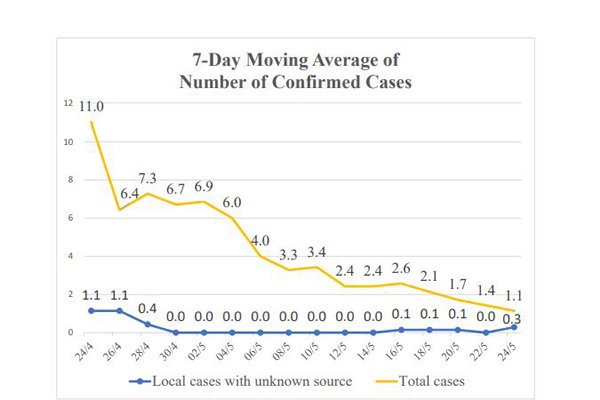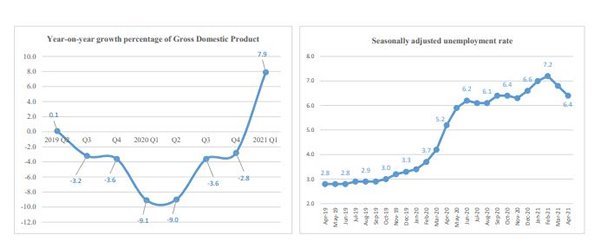Say no to vaccine hesitancy
Chief Executive Carrie Lam
The epidemic situation has remained stable in the past month, with no local cases with unknown sources of infection for many days. After more than a year of hard fight against the virus by the whole community, there is hope of achieving zero infection in Hong Kong. While it is encouraging to see the epidemic under control, the Government will not be complacent. The recent rebound of cases in a number of neighbouring places is a timely reminder to us that we must not let down our guard and must continue to keep up our efforts, with vaccination being the most important measure.
The latest epidemic situation
In the month from April 25 to May 24, there were only three local cases with unknown sources, and the circumstances of the cases were quite special with the patients having a low viral load or already carrying antibodies. It is possible that the patients had been infected much earlier or viral interference had occurred, and it is believed that transmissibility was not high and the risks posed to the community were low. Nevertheless, decisive and stringent actions were taken to cordon off relevant areas to conduct compulsory testing and put the relevant residents in quarantine according to the new direction in fighting the pandemic announced last month, with a view to cutting off any possible chains of transmission.
Anti-epidemic efforts
As the local epidemic situation has stabilised with only sporadic confirmed cases, the need to step up efforts to guard against the importation of cases is all the more necessary. In the past month, the Government has at different times extended or tightened the entry restrictions and quarantine requirements for incoming travellers from places including India, Pakistan, the Philippines, Nepal, Taiwan, Argentina, Italy, Japan, Kenya, Malaysia, the Netherlands and Singapore. On the prevention of the spreading of the virus in the community, in addition to the comprehensive and thorough investigation of each local confirmed case including conducting gene sequencing tests, we have continued to step up virus testing. In this connection, we have conducted over 120,000 virus tests per day on average in the past month, which is record breaking. Among them, since a number of cases involving foreign domestic helpers (FDHs) have been found, we have twice required all the about 370,000 FDHs in Hong Kong to undergo compulsory testing, resulting in the identification of several cases that required follow-up actions. I would like to express my gratitude to FDHs, their employers and the relevant consulates for their support and co-operation and my appreciation to laboratory personnel for their hard work.
Regarding the food quality issue and unsatisfactory admission and discharge arrangements of quarantine centres during the above period, I hope that the public will understand the challenges faced by my colleagues in having to arrange for a large number of people to undergo quarantine within an extremely short period of time. The Government has already reflected on the experience and made steps for improvements.
The major measures introduced are set out below chronologically:
|
Date |
Event |
|
April 29 |
|
|
April 30 |
As two cases involving the N501Y mutant strain were FDHs, the Government required all FDHs in Hong Kong to undergo compulsory testing by May 9. |
|
May 7 |
|
|
May 12 |
All FDHs in Hong Kong were required to undergo compulsory testing for the second time from May 15 to May 30. Fully vaccinated FDHs were exempted from the requirement. |
|
May 16 |
In view of the epidemic situation in Taiwan, the Government tightened the testing and quarantine arrangements for arrivals who have stayed in Taiwan. Non-Hong Kong residents who have stayed in Taiwan would be denied entry. |
|
May 17 |
In view of the epidemic situation in Singapore, the governments of Hong Kong and Singapore decided to defer the target date of the inaugural flights under the bilateral Air Travel Bubble scheduled for May 26. |
|
May 18 |
|
|
May 21 |
|
|
May 24 |
|
|
May 25 |
|
Hope is on the horizon with the economy rebounding
With the epidemic situation remaining stable and social distancing measures relaxed, there are more people on the street and many people go to shopping malls, the countryside, the beach and so on at the weekend. In addition, by putting various anti-epidemic measures in place, we have successfully held a number of large-scale events in our city, including the UCI Track Cycling Nations Cup, Art Basel Hong Kong, the French May Art Festival and more. The economic indicators released last month are also encouraging.
However, whether our economy will continue to improve in the time to come depends crucially on the resumption of travel between Hong Kong and the Mainland, as well as between Hong Kong and overseas. For this to happen, it is essential for us to strive towards zero infection and achieve widespread vaccination.
Say no to vaccine hesitancy
Experts have repeatedly told us that vaccination represents the best hope, or perhaps even the only hope, for Hong Kong and the world to get out of the pandemic. As a matter of fact, in some parts of the world where the vaccination rate is high, the epidemic situation has improved significantly and people’s lives are returning to normal gradually. Hesitating about vaccination, taking a wait-and-see attitude, or thinking that vaccination is not necessary as the epidemic situation is stable, is acting against the aspirations of the whole community.
For yourself and others, please do not hesitate anymore and get vaccinated as soon as possible!
Chief Executive Carrie Lam issued this article titled Say No to Vaccine Hesitancy on May 26.

